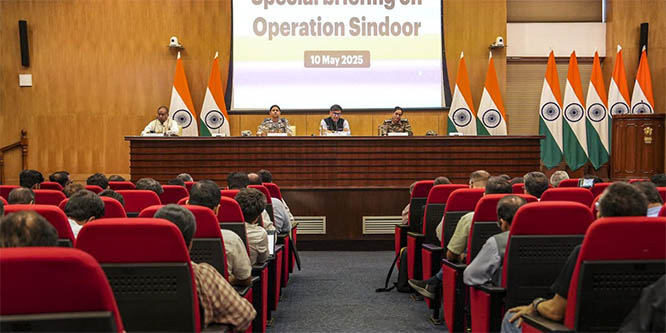New Delhi, May 10: In a detailed joint briefing today, India’s defence and foreign ministries dismantled Pakistan’s claims of major strikes on Indian infrastructure and exposed Islamabad’s alleged attempts to escalate conflict along the border. Here's a clear breakdown of 12 crucial points made by Indian military officials:
1. Pakistan’s Claims Are False
The Indian government called Pakistan’s statements about destroying airbases, power grids, and cyber systems “completely false” and “state-sponsored propaganda.”
2. No Damage to Indian Airbases
Indian officials categorically denied Pakistani claims of hitting Sirsa, Suratgarh, and the S-400 radar base in Udhampur.
3. Pakistan Used Multiple Attack Platforms
Pakistan employed UCAVs (unmanned combat aerial vehicles), loitering munitions, long-range missiles, and fighter aircraft to target military and civilian sites.
4. Civilian Infrastructure Targeted
Pakistan struck schools and a Medicare centre near Indian Air Force bases in Srinagar, Awantipora, and Udhampur.
5. Over 26 Locations Attacked
India reported air intrusions and harassment attacks across 26+ locations from Srinagar to Naliya, along the Line of Control (LoC) and international border.
6. Limited Damage at IAF Bases
Minor damage occurred at four IAF stations: Udhampur, Patan, Adampur, and Bhuj — but all operations remain unaffected.
7. Heavy Cross-Border Shelling
Sectors like Kupwara, Baramulla, Poonch, Rajouri, and Akhnoor saw intense artillery, mortar, and small arms fire — all met with strong Indian retaliation.
8. Pakistan Moving Troops to Forward Areas – Signals Possible Escalation
The Indian Army observed significant Pakistani troop mobilisation toward forward posts along the LoC. This movement, described as “indicative of offensive intent,” suggests that Pakistan may be preparing for a wider military escalation. The Indian armed forces are on high operational alert, closely monitoring the situation and ready to respond to any provocation.
9. India’s Response: Swift, Measured, Targeted
In retaliation, India struck only military assets — radar stations, command centres, and storage sites — using precision air-launched weapons.
10. No Damage to Critical Indian Defences
Pakistan’s claims of destroying India’s S-400 systems, BrahMos base, and Chandigarh ammo depot were debunked with timestamped visual evidence.
11. Pakistan Trying to Spread Communal Discord
Indian officials accused Pakistan of fabricating stories to stoke communal unrest in India — calling such efforts "doomed to fail."
12. India Committed to Responsible Conduct
India reiterated its commitment to non-escalation — “provided Pakistan reciprocates.” Officials stressed that India’s military operations have been calibrated and proportionate.








Comments
Batate kyun nahi is desh ke gender biased law ki aahuti ek aur naujawan chad gaya, kab tak woman empowerment ke naam par aadmiyo ki bali lete rahoge, shame on judiciary and govt. Who made sach draconian laws like 498a and dv
Bad news for Civil Service aspirants.
Add new comment